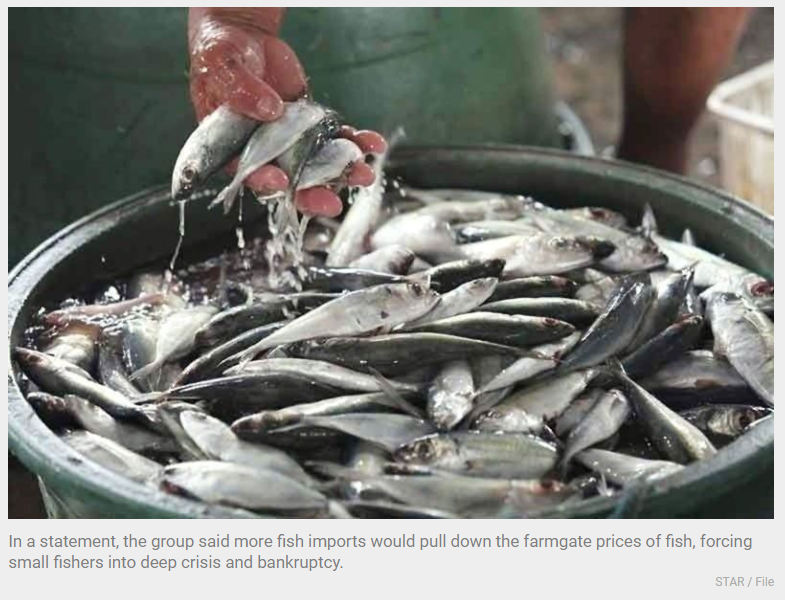Philippines: Fishers buck fish imports
MANILA, Philippines — Fisherfolk group Pambansang Lakas ng Kilusang Mamamalakaya ng Pilipinas (PAMALAKAYA) is opposing the Department of Agriculture (DA)’s approval of the importation of 60,000 metric tons (MT) of small pelagic fish, saying such a move will hurt local fishers.
In a statement, the group said more fish imports would pull down the farmgate prices of fish, forcing small fishers into deep crisis and bankruptcy.
“Flooding our local markets with imported fish will pose more harm than good to our struggling fishing industry,”PAMALAKAYA National chairperson Fernando Hicap said.
“This liberalization scheme never addresses the country’s crisis in fisheries production. Rather, it is burden to local fisherfolks whose fishery products are affected by imported fish,” he said.
Agriculture Secretary William Dar announced earlier this week the issuance of 60,000 MT of certificates of necessity (CNI) to import small pelagic fish in the first quarter.
Dar cited the damage caused by Typhoon Odette on the fisheries sector valued at P3.97 billion as well as the continued rise in food inflation as among the reasons for approving the fish imports volume.
“To augment the local catch in view of the severe damage of Typhoon Odette to the fisheries and aquaculture sector and given that closed fishing season in three major fishing grounds (Visayan Sea, Northern Palawan and Basilan-Sulu-Zamboanga) are still in effect, all SPSICs (Sanitary and Phytosanitary import clearances) under the Q1 2022 CNI 60,000 MT shall be issued before the lifting of the closed fishing season and shall automatically expire on March 31, 2022,”Dar said.
The importation was approved despite the pronouncement of the National Fisheries and Aquatic Resources Management Council (NFARMC) that the country has enough fish supply.
“Maybe that’s their thinking. But based on data from the BFAR (Bureau of Fisheries and Aquatic Resources), we have a potential deficit of 119,000 MT this quarter,” Dar said, adding that the NFARMC merely has recommendatory responsibility.
PAMAKALAYA said the projected supply deficiency is caused by the existing closed fishing season.
“Following the government’s reasoning for importation, why place our major fishing grounds under closed fishing season when it generates artificial shortage in the first place?,”the group questioned.
“The existing closed fishing season creates an artificial shortage of fish and inflation that detriments fisherfolks and consumers. We maintain that the shortage of fish is artificial, caused by unregulated and unjust declaration of closed fishing season in our productive fishing grounds,”Hicap said.
The DA earlier said that the closed fishing season is implemented annually to allow fish stocks to replenish and recover in a bid to ensure the abundance of the supply.
According to the DA, the closed fishing season is implemented at the Davao Gulf from June 1 to Aug. 31, Visayan Sea from Nov. 15 to February 15, Sulu Sea from Dec. 1 to Feb. 28 and in Northeast Palawan from November to January.
“But even if there is an existing closed fishing season, we remind the government that there are lots of fish in our seas, importation is unnecessary,”Hicap said.
Based on the guidelines for the approved first quarter CNI, the 60,000 MT volume shall be apportioned through an auction system among the registered and qualified importers.
Qualified importers must have been able to import at least 70 percent of the total volume issued during the last importation period and don’t have filed cases by the BFAR regarding food safety and importation violations.
The importer must also be willing to sell the imported fish at a price determined after the auction which shall not exceed P90 and shall be traded only in any of the Philippine Fisheries Development Authority (PFDA)-designated trading areas or PFDA fish ports for effective monitoring of fish disposition.
It must also be willing to pay P500 for every MT of volume awarded.
“Right after the conduct of the auction is completed, the importer shall immediately apply for SPSIC, and BFAR shall immediately process such applications and endorse the same to the Secretary for approval,”the DA said.
Dar said the DA is looking at strategies for the quicker distribution of imported fish from cold storages in the country.
He said the problem is that most of the imported fish supply is stuck in the country’s cold storages.
“I have directed BFAR to see to it that the imported galunggong (round scad) must reach the wet markets,” Dar said.
Latest market monitors from the DA showed that the price of local round scad or galunggong stood at P250 a kilo yesterday.
Imported galunggong registered lower prices at P240 a kilo.
Source: https://www.philstar.com/business/2022/01/20/2154999/fishers-buck-fish-imports


 Thailand
Thailand




